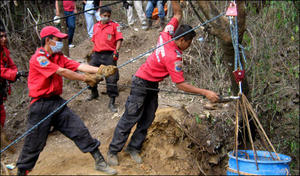Mexico: descent into chaosMexico to up security in border city after blasts
Following a series of explosions in downtown Reynosa, across the border from McAllen, Texas, the Mexican government is rushing reinforcements to the city; at the same time, thirty-five of the seventy-two bodies found in a mass grave on Saturday had been identified: sixteen Hondurans, thirteen Salvadorans, five Guatemalans, and a Brazilian; they were killed after refusing to cooperate with drug gangs

Removing bodies from mass grave // Source: thesun.co.uk
Mexico’s government on Sunday promised to increase security after a series of explosive devices were detonated in the border city of Reynosa, and officials said they would step up efforts to identify more of the seventy-two migrants massacred last week in the same state.
The Interior Department said it “energetically condemned” the explosions in Reynosa, located in Tamaulipas state across the border from McAllen, Texas, but did not confirm local media reports that the explosions were caused by three hand grenades and that they had wounded roughly a dozen people. The department confirmed there were victims, and offered to help them.
The Reynosa city government said on its Twitter site that “an explosive device” detonated downtown near the La Quebradita bar on Saturday, and advised residents to stay out of the area. Cross-border traffic was not affected.
Last week, Reynosa city officials publicly admitted that drug violence in their city made it unsafe for visitors ((“Mexican city is no longer safe for visitors, city’s economic secretary says,” 23 August 2010 HSNW).
Local media reported that nine of the twelve victims were wounded seriously, though the city could not confirm the reports. The area has been the scene of bloody turf battles between the Gulf cartel and the Zetas, the gang that a survivor named in the migrant slaughter discovered last Tuesday in San Fernando, a town near Reynosa.
AP reports that the Central and Southern Americans were killed after they refused to work for the gang, according to Mexican officials. Drug gangs have branched out into human trafficking for extortion and to recruit members.
Thirty-five had been identified by Sunday: sixteen Hondurans, thirteen Salvadorans, five Guatemalans, and a Brazilian. Documents belonging to another Brazilian man were found at the scene of the killings, but his body has not been identified. The lone survivor, an Ecuadorean, escaped and reported the slaughter to the Mexican military.
Migrants hopping freight trains through Mexico to get to the United States are often subjected to kidnappings, beatings, and extortion along the way.
Salvadoran president Mauricio Funes said Saturday he wanted to meet with Mexican President Felipe Calderon to coordinate efforts to combat drug violence. More than 28,000 Mexicans have been killed in drug-related violence since Calderon launched an offensive against the cartels in late 2006.
“This war is not going to be won using the tools and methods traditionally used to fight crime,” Funes said. “The challenge posed by the criminals requires other responses, other weapons, and intelligence.”
Other developments
- The Mexican army announced Saturday that it had captured Zeta lieutenant Juan Zapata Gallegos, who allegedly oversaw the gang’s operations in the northern city of Monterrey, during a raid in that city Friday. The army said the suspect had confessed to participating in an attack in March that resulted in the deaths of two Monterrey Tech University students. Mexico’s Defense Department has said the students were caught in crossfire between soldiers and gunmen. The army quoted Zapata Gallegos as saying Zetas were trying to free a drug suspect detained earlier with cocaine.
- In the western state of Michoacan, federal police said Sunday they had detained the La Familia cartel lieutenant who allegedly oversaw the gang’s operations in the state capital of Morelia. Suspect Jose Luis Garcia Vazquez and five other alleged gang members were arrested a week ago; police did not say why they had delayed announcing the arrests. Police said Garcia Vazquez had admitted to participating in two ambush-style attacks that killed a total of 16 federal officers.
- In Jalisco state, authorities in a rural town near the resort of Puerto Vallarta reported that the bodies of four men were found with execution-style gunshot wounds to the head.
